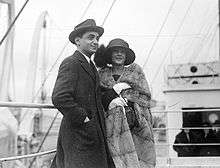Dorothy Goetz
| Dorothy Goetz | |
|---|---|
 Irving Berlin and Dorothy Goetz | |
| Born |
February 5, 1892 Buffalo, New York, U.S. |
| Died |
July 17, 1912 (aged 20) New York, U.S. |
| Cause of death | Typhoid fever |
| Resting place | Forest Lawn Cemetery, Buffalo |
| Spouse(s) | |
| Parent(s) |
Edward H. Goetz Mary T. Goetz |
| Relatives | E. Ray Goetz (brother) |
Dorothy Goetz (February 5, 1892 – July 17, 1912) was the first wife of songwriter Irving Berlin. She was born in Buffalo, New York, to Edward H. and Mary T. Goetz.[1]
Early life and romance
Goetz was nineteen years-old when she met Berlin in New York City, where her older brother, singer and lyricist (and later a Broadway producer) Ray Goetz, had been collaborating on some tunes with Berlin. Goetz, who was also a singer, wanted to meet Berlin in order to obtain one of his songs to sing. At that meeting she got into a brawl with another singer who also wanted the song. Berlin gave the song to the other singer, but asked Goetz out on a date. Within a few weeks, they were deeply in love, and Berlin proposed marriage some weeks after their meeting. They were married in February 1912, and went to Cuba on their honeymoon.
Death and aftermath
Shortly after their arrival an outbreak of typhoid occurred. Upon returning to New York, Goetz became sick. Her illness worsened over the next few months, with doctors unable to help her, until she died on July 17.[2]
Berlin was deeply affected by her death, and for a while his songwriting was affected and he wrote several joyless songs. Five months later he decided to write about his wife's death, pouring his grief into the ballad called "When I Lost You", a simple waltz with a bittersweet harmony under the melancholy melody.[2] Berlin insisted that the song was based on his wife's death, the only song he ever admitted was related to his own experience.[3] He did not marry again for twelve years.[2]
Footnotes
- ↑ Find A Grave (1998). "Dorothy Goetz Berlin". Retrieved 30 June 2013.
- 1 2 3 Bergreen, Laurence (1996) [1990]. As Thousands Cheer: The Life of Irving Berlin. New York: Da Capo Press. pp. 81&ndash, 88. ISBN 0-306-80675-4.
- ↑ Furia, Philip (1990). The Poets of Tin Pan Alley: A History of America's Great Lyriscists. New York: Oxford University Press. p. 55. ISBN 0-19-506408-9.